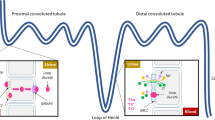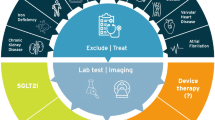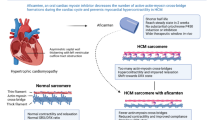Background:
Despite routine use of angiotensin-converting enzyme (ACE) inhibitors, β-blockers and spironolactone in patients with heart failure due to dilated cardiomyopathy (DCM), these patients still have a considerable annual mortality rate of 5–10%. Sudden unexpected death accounts for up to 50% of all deaths and is most often due to rapid ventricular tachycardia or ventricular fibrillation and less often due to bradyarrhythmias or asystole.
Therapeutic Options: The use of β-blockers in patients with heart failure has been shown to improve overall mortality considerably. This survival benefit has been demonstrated for bisoprolol, metoprolol and carvedilol. Therefore, one of these three β-blocking agents should be administered routinely starting with low doses in all patients with New York Heart Association (NYHA) class II or III heart failure in addition to ACE inhibitors, unless there is a contraindication to β-blocker use. In addition, NYHA class IV heart failure patients have been shown to benefit from carvedilol therapy, if tolerated. The conflicting results of GESICA and CHF-STAT studies do not support a strategy of “prophylactic” amiodarone therapy in patients with DCM in order to prevent sudden cardiac death. Despite growing evidence that implantable cardioverter defibrillator (ICD) therapy results in improved overall survival py preventing sudden cardiac death in patients at high risk for serious arrhythmic events, arrhythmia risk stratification with regard to prophylactic ICD implantation remains highly controversial in patients with DCM.
Conclusion: This review describes potential arrhythmia mechanisms in DCM and summarizes the results of antiarrhythmic drug trials and of prophylactic ICD trials in patients with heart failure as well as our knowledge concerning arrhythmia risk stratification in patients with DCM.
Hintergrund:
Trotz der routinemäßigen Anwendung von Angiotensinkonversionsenzym-ACE-)Hemmern, β-Blockern und Spironolacton bei Patienten mit Herzinsuffizienz auf dem Boden einer dilatativen Kardiomyopathie (DCM) haben diese Patienten eine beträchtliche jährliche Mortalität von 5–10%. Der Anteil plötzlicher und unerwarteter Herztodesfälle beträgt hierbei bis zu 50% und ist zumeist durch schnelle Kammertachykardien oder Kammerflimmern und seltener durch Bradyarrhythmien oder Asystolien bedingt.
Therapieoptionen: Für die β-Blocker Metoprolol, Bisoprolol und Carvedilol wurde bei Patienten mit Herzinsuffizienz in den Stadien II und III der New York Heart Association (NYHA) eine deutliche Senkung der Gesamtmortalität nachgewiesen. Dementsprechend sollten diese Patienten routinemäßig mit einem dieser drei β-Blocker in einschleichender Dosierung behandelt werden, sofern keine Kontraindikation hierfür besteht. Für Patienten im NYHA-Stadium IV der Herzinsuffizienz wurde außerdem eine Prognoseverbesserung durch Carvedilol nachgewiesen. Die widersprüchlichen Ergebnisse der GESICA- und CHF-STAT-Studien sprechen gegen eine “prophylaktische” Amiodaron-Therapie zur Verhinderung des plötzlichen Herztodes bei Patienten mit DCM. Obgleich sich die Datenlage für eine prophylaktische Therapie mit dem implantierbaren Kardioverter-Defibrillator (ICD) bei Patienten mit hohem Risiko für lebensbedrohliche Arrhythmien ständig bessert, wird eine prophylaktische ICD-Therapie bei Patienten mit DCM derzeit noch sehr kontrovers diskutiert.
Schlussfolgerung: Diese Übersicht beschreibt zunächst potentielle Arrhythmiemechanismen bei Patienten mit DCM. Anschließend werden die enttäuschenden Ergebnisse von Antiarrhythmikastudien zur Primärprophylaxe des plötzlichen Herztodes bei Patienten mit Herzinsuffizienz zusammenfassend dargestellt. Schließlich werden bereits abgeschlossene und noch laufende Studien zur prophylaktischen Defibrillatorimplantation sowie unser derzeitiges Wissen zur Arrhythmie-Risikostratifikation bei Patienten mit DCM besprochen.
Similar content being viewed by others
Author information
Authors and Affiliations
Additional information
The Marburg Cardiomyopathy Study (MACAS) is supported by a grant (Gr 1130/2-1/2/3) from the German Science Foundation, Bonn, Germany.
Correspondence Address Wolfram Grimm, MD, Department of Cardiology, Hospital of the Philipps University Marburg, Baldingerstraße, 35033 Marburg, Germany, Phone (+49/6421) 286-6462, Fax -8954, e-mail: Wolfram.Grimm@med.uni-marburg.de
Rights and permissions
About this article
Cite this article
Grimm, W., Maisch, B. Sudden Cardiac Death in Dilated Cardiomyopathy – Therapeutic Options. Herz 27, 750–759 (2002). https://doi.org/10.1007/s00059-002-2425-0
Issue Date:
DOI: https://doi.org/10.1007/s00059-002-2425-0




